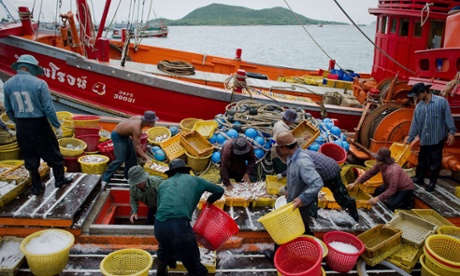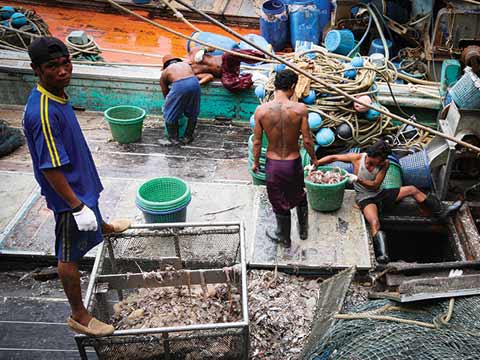Thailand is failing to protect migrant workers on fishing trawlers from murder and starvation, with trafficking and forced labour still rampant despite new government legislation, according to a new report.
In an unusually critical ruling by the UN’s labour agency, the International Labour Organisation has urged the Thai government to remedy continued abuses on fishing vessels operating in Thai waters. It follows a formal complaint to the ILO by international trade unions last year, which highlighted evidence of migrant workers enduring 20-hour working days, physical abuse and non-payment of wages.
Activists greeted the ruling as further evidence that little progress has been made on these issues, despite continued pressure from the EU and US.
The evidence submitted to the ILO by the International Transport Federation (ITF) and the International Trade Union Conference (ITUC) catalogued various instances of forced labour and abuse on Thai fishing vessels, following a series of interviews with Thai and migrant workers conducted by the ITF in 2015.
- Workers claimed they were locked up and forced to work on vessels in Indonesian waters, often fishing illegally, despite paying huge recruitment fees. One worker was severely beaten by his captain and chained to the boat by his neck after trying to escape.
- Workers said they had witnessed the murder of crewmen by their captains. One man claimed his captain shot dead a Cambodian worker and killed four Thai fishermen by throwing them overboard.
- Workers said they were subject to debt bondage, worked unpaid and witnessed captains physically abusing other crew. They also described 20-hour working days and said food was limited.
The cases outlined in the unions’ complaint echo accounts of modern slavery and severe abuse highlighted in previous investigations, including those by the Guardian in 2014. They also underscore reports by the Thai government itself of severe abuses on Thai boats in the Saya de Malha, off the coast of Madagascar, where nearly half of the 1,000 fishermen on 50 vessels were working in violation of immigration and labour laws.
Interviews by Greenpeace with fishermen on board tuna gillnetters that had been operating in the same bank revealed claims that the men had been trafficked and forced to work with just four hours’ rest a day. Some of the fishermen claimed to have been at sea for five years continuously.
Thailand’s $6.5bn (£5.2bn) seafood export industry – the world’s fourth largest, according to the most recent figures – has suffered significantly following allegations of human rights and labour abuses, and illegal, unreported and unregulated fishing. In 2014, Thailand was downgraded in the US state department’s Trafficking in Persons report, which marks countries for their stance on slavery. In 2015, Thailand was given a “yellow card” warning by the EU to clean up or face a ban on EU imports.
The Thai government has introduced some reforms and new laws to address trafficking and forced labour, but the ILO report emphasises that not enough has been done. It points to gaps in the country’s legal framework and enforcement, in particular in the regulation of brokers who recruit workers, the prosecution of corrupt officials, and the effective inspection of vessels.
Through its embassy in London, the Thai government said it had cooperated fully with the ILO investigation, and that the ILO had recognised the efforts made by Thailand to eliminate forced labour in its fishing and seafood industry. The government said it had made further progress in the areas highlighted by the ILO since the complaint was filed.
Johnny Hansen, chair of the ITF fisheries section, welcomed the ILO ruling. “We recognise the progress made by the Thai government,” he said. “But this ruling shows that it still has a long way to go to achieve real change for the countless migrant fishers trapped into forced labour, trafficking, deplorable working conditions and physical abuse.”
Steve Trent of the Environmental Justice Foundation, said the Thai government has made only inconsistent attempts to address forced labour, despite recent 14-year jail sentences for traffickers in the port of Kantang.
Trent said: “On one hand, there’s been structural reforms. But the situation remains the same: there’s inconsistent and ad-hoc implementation of the law, and obvious abuses still continue because of corruption or rogue businesses or vessels.”
Human rights activist Andy Hall, who recently fled Thailand due to ongoing prosecutions related to his work, said the country had an “endemic” problem. “Not only on fishing boats, but also on poultry farms, on rubber plantations, in large seafood and poultry export factories, as well as in the factories exporting medical supplies like rubber gloves across the world and in the fruit and vegetable export sectors.”












